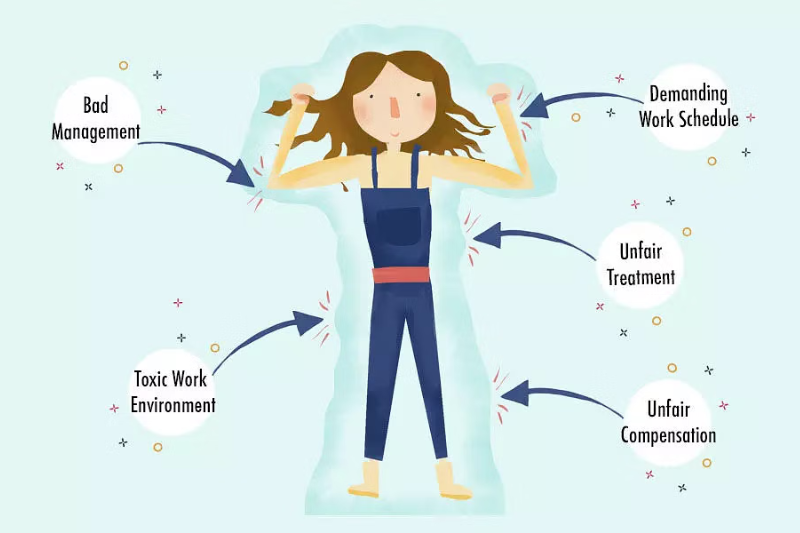

strategies to deal with burnout and work related stress in a competitive work environment
Burnout and work-related stress are common problems in today’s fast-paced and demanding workplace. High-stress levels and employee burnout are frequently caused by the pressure to produce results fast and work long hours in a competitive atmosphere. This article covers productive methods people can use to control and lessen stress and burnout at work. These methods are supported by research.
According to research by the Journal of Occupational Health Psychology, workers who draw boundaries between their personal and professional lives report less burnout and more job satisfaction. The American Psychological Association reports that 44% of employees who set up clear limits report feeling better about their well-being than those who don’t. People can maintain a healthy work-life balance by setting clear objectives and allotting specified time for personal activities.
According to a study published in the Journal of Occupational and Environmental Medicine, self-care activities like exercise can help employees avoid burnout. According to the American Institute of Stress, 28% of workers reported lessened stress when including self-care in their routines. Regular self-care practices have also been associated with lower stress levels. Maintaining physical and mental health is crucial for stress management and avoiding burnout.
According to research findings in the Journal of Applied Psychology, workers who feel supported at work experience less burnout and greater job satisfaction. A Gallup study also showed that workers who feel supported by their superiors are 70% less likely to burn out. Stress levels can be considerably reduced and well-being improved by fostering a supportive culture that values honest communication, teamwork, and recognition.
According to the Journal of Occupational and Environmental Medicine study, efficient task management and time prioritization are essential to lowering employee burnout. People can avert crushing workloads and keep a sense of control over their duties by defining realistic goals, reducing chores into manageable chunks, and concentrating on high-priority activities. Time management strategies, such as setting priorities and refraining from multitasking, can also increase productivity and lessen stress.
A University of Illinois at Urbana-Champaign survey indicated that taking brief mental breaks during work improved focus and decreased stress. According to the Society for Human Resource Management, employees who regularly took breaks saw a 33% boost in productivity. Short breaks, relaxation, and mindfulness exercises can all help people refuel and keep their productivity high throughout the workday.
According to a study published in the Journal of Occupational Health Psychology, workers who receive social support from their coworkers report reduced burnout and higher levels of job satisfaction. Stress can be considerably reduced, and a healthy office atmosphere can be created by developing solid relationships with coworkers, asking for assistance when necessary, and creating a supportive network inside the workplace.
According to a meta-analysis published in the Journal of Occupational Health Psychology, mindfulness therapies have been successful in lowering burnout and improving employee well-being. According to a National Institutes of Health study, practicing mindfulness, which calls for paying attention to the present moment and maintaining an awareness free of judgment, has been demonstrated to significantly lower stress levels by 28%. Relaxation and mental clarity can be promoted by incorporating mindfulness practices or meditation into regular routines.
Employee assistance programs offer resources and support for individuals experiencing burnout and stress at work. According to the International Employee Assistance Professionals Association, these initiatives have been proven to lower absenteeism, boost productivity, and enhance employee well-being. The use of these resources for counselling, stress reduction methods, and other support services by employees should be promoted.
To prevent burnout and stress from the workplace, work-life balance is essential. According to a Society for Human Resource Management poll, 89% of workers said work-life balance was crucial to preventing burnout. To achieve a healthy balance between work and personal life, people should be encouraged to prioritize personal time, partake in activities outside of work, and set limits.
Burnout can be avoided by regularly assessing the workload and making necessary modifications. This entails assigning duties to others, reassigning accountability, and asking for assistance as required. Research indicated that workers with control over their workload report less burnout and higher job satisfaction, as reported in the Journal of Applied Psychology.
In conclusion, excessive stress and burnout may result from the competitive workplace climate and hustling culture. However, individuals can successfully manage and reduce burnout and work-related stress by putting into practice strategies like setting clear boundaries, practicing self-care, creating a supportive work environment, prioritizing workload and time management, taking regular breaks, seeking social support, practicing mindfulness, utilizing employee assistance programs, promoting work-life balance, and regularly assessing workload. These tactics improve well-being, boost job satisfaction, and support a safer and more effective working environment.
A March executive order issued by the Trump administration faced temporary legal blockage which protected the collective bargaining capabilities of…
A much anticipated weekly job fair is scheduled to take place on 26 April 2025 and it has been titled…
Unilever has given the thumbs up to the layoffs of 6,000 jobs around the world as part of its restructuring…
This shocking accusation has surfaced in a new lawsuit against the coffee giant Starbucks. A labor rights group called International…
One of the leading companies, Elkay Plumbing Products who is known for manufacturing faucets, bottle filling stations, drinking foundations and…
The Martz Gold Line workers in Maryland marched out one early Thursday morning for the strike. They made their point…
This website uses cookies.
Read More